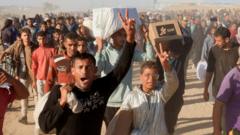Should the US-Israeli Backed Gaza Aid Group Be Shut Down? 130 Charities Say Yes!

Understanding the Gaza Humanitarian Foundation Controversy
The Gaza Humanitarian Foundation (GHF) has become a focal point of controversy amid the ongoing humanitarian crisis in Gaza. Over 130 charities and NGOs, including prominent organizations like Oxfam, Save the Children, and Amnesty International, are calling for its immediate closure. The foundation, backed by both Israel and the United States, has faced severe criticism for its operational practices, which many believe endanger the lives of Palestinians seeking aid. This article delves into the alarming statistics surrounding the GHF's operations, the humanitarian implications, and the broader context of aid distribution in Gaza.
The Humanitarian Crisis in Gaza
Gaza has been grappling with an acute humanitarian crisis for years, exacerbated by ongoing conflict, blockades, and political instability. With a population of nearly two million people, the region has witnessed devastating situations, including high casualties among civilians. Following the establishment of the GHF in late May, the situation has deteriorated further, leading to tragic outcomes.
Casualties and Injuries
Since the GHF began its operations, reports indicate that over 500 Palestinians have lost their lives while attempting to access aid, with almost 4,000 others injured. These alarming statistics highlight the increasing dangers that individuals face even when seeking basic necessities, such as food and medical care.
The Role of Israeli Forces and Armed Groups
Many organizations assert that Israeli forces and armed groups routinely open fire on Palestinians who are trying to reach aid distribution points. While Israel has denied these allegations, stating that its soldiers do not intentionally target civilians, the situation on the ground tells a different story. Eyewitness accounts and reports from medics and the Hamas-run health ministry corroborate claims of violent encounters at these aid sites.
Conflicting Narratives
The Israeli military has acknowledged that it is reviewing reports of civilian harm around GHF distribution centers. However, they maintain that there is no systematic targeting of unarmed civilians. This has led to a complex situation where conflicting narratives complicate the understanding of what is happening on the ground.
Concerns Raised by Humanitarian Organizations
The joint statement from the humanitarian organizations emphasizes that the GHF is violating fundamental principles of humanitarian work. The foundation has replaced over 400 aid distribution points with just four military-controlled sites. This change has forced many Palestinians to navigate overcrowded and militarized zones, risking their lives for access to food and medical supplies.
Impact on Vulnerable Populations
Among the most affected are orphaned children and caregivers. The report revealed that children have been harmed in over half of the documented attacks on civilians at these aid sites. The humanitarian organizations highlighted that this is an unacceptable response to an already dire situation.
United Nations’ Stance on the GHF
The United Nations has consistently condemned the GHF's approach, labeling it as "inherently unsafe." UN Secretary-General Antonio Guterres has voiced concerns about the militarization of aid distribution, warning that it undermines the existing humanitarian framework in Gaza. The UN argues that the GHF's operational model forces individuals to make perilous journeys through dangerous territories, further complicating an already tragic scenario.
Calls for Change and the Way Forward
The humanitarian organizations are calling for the immediate cessation of GHF operations, advocating for a transition to a United Nations-led aid system that can ensure the safety and security of individuals seeking assistance. The current situation, as described by the organizations, is not a humanitarian response but rather a perilous gamble with people's lives.
Current Conditions in Gaza
Amidst severe hunger and famine-like conditions, many families report feeling too weakened to compete for scarce food rations. The humanitarian landscape in Gaza is characterized by desperation as individuals face the impossible choice of risking their lives to access food or succumbing to starvation.
Conclusion: A Call for Humanitarian Dignity
The situation in Gaza is a stark reminder of the ongoing humanitarian challenges that persist in conflict zones. With over 130 charities and NGOs advocating for change, the call for the closure of the GHF underscores the urgent need for a more effective and humane approach to aid distribution. As we reflect on this complex crisis, it becomes clear that humanitarian efforts must prioritize the safety and dignity of those they aim to help.
In light of these events, it is crucial for the international community to engage in dialogue, assess the humanitarian framework, and find solutions that prioritize human life over political agendas. The question remains: how can we ensure the safety of vulnerable populations in conflict zones while delivering essential aid? #GazaAid #HumanRights #HumanitarianCrisis
FAQs
What is the Gaza Humanitarian Foundation (GHF)?
The Gaza Humanitarian Foundation (GHF) is an aid distribution initiative backed by Israel and the United States, aimed at providing humanitarian assistance in Gaza amid ongoing conflict and blockade.
Why are charities calling for the GHF to be shut down?
Over 130 charities and NGOs have called for the GHF's closure due to reports of civilian harm and fatalities while seeking aid, suggesting that the foundation violates humanitarian norms and places individuals in dangerous situations.
How has the situation in Gaza changed since the GHF started operating?
Since the GHF began its operations, there have been significant increases in casualties among Palestinians seeking aid, raising concerns about the safety and effectiveness of the aid distribution model implemented by the foundation.
What alternatives are being proposed for aid distribution in Gaza?
Humanitarian organizations are advocating for a United Nations-led aid distribution system that can ensure the safety and security of individuals seeking assistance, as opposed to the current militarized approach.
What are the implications of the humanitarian crisis in Gaza?
The humanitarian crisis in Gaza has led to severe food shortages, increased casualties, and a deteriorating quality of life for the population, highlighting the urgent need for effective and safe humanitarian responses.
Published: 2025-07-01 05:09:24 | Category: technology



